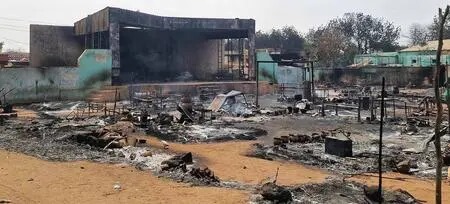Sudan: Violent attacks on schools and education surge fourfold in one year of conflict

The number of violent attacks on schools and education in Sudan has increased fourfold since the start of the conflict in April last year with 88 reports of violent incidents and most schools now closed, according to Save the Children analysis released today.
These incidents include airstrikes on schools resulting in the killing and injury of students and teachers, torturing of teachers, killing and abduction of teachers and sexual violence against students inside education facilities. Other incidents included occupation of schools by armed groups, use of schools as weapons storage facilities, and battles fought on education premises.
The analysis comes as the Education Cluster warns that the country is on the brink of the worst education crisis in the world, with the majority of schools closed, leaving more than 18 million children of the country’s estimated 22 million children out of school for over a year now.
For the analysis, Save the Children reviewed individual incidents of armed attacks or confrontations affecting education reported in the Armed Conflict Location & Event Database (ACLED) between April 2023 and April 2024 across Sudan and saw an alarming rise in attacks. Twenty-three such incidents were recorded by ACLED in the 12 months before the conflict.
The number of violent attacks on schools and education in Africa has been on the rise. In February, a similar analysis by Save the Children ahead of the 37th Ordinary Session of the Assembly of the Heads of State and Government of the African Union (AU) in Addis Ababa, Ethiopia, showed a rise in violence affecting schools, teachers and learners across Africa Union countries, with 411 cases reported, representing a 20% jump in 2023.
In light of this trend, Save the Children is calling on leaders in Sudan and across the African Union to make schools safe places for children, having chosen education as “AU theme for 2024”, and committed to building resilient education systems for increased access to inclusive, lifelong, quality, and relevant learning in Africa.
Hadeer*, 13, was displaced with her family from Omdurman, Khartoum state, to Atbara, about 320 km northeast. She has three younger siblings. Her aunt and uncle were killed, and her nieces fled Sudan. Her family lost contact with her father in the chaos of the conflict. Until Save the Children built a school in the camp for displaced people in Atbara, she never thought she would be able to study again.
Save the Children is calling for urgent political action at national, regional and international levels to end the fighting and bring about a locally led comprehensive peace process. The aid agency is also calling on all parties to the conflict to adhere to their obligations under international law, including guaranteeing humanitarian access and ensuring children are protected.
“Sudan is a signatory to the Safe Schools Declaration, an inter-governmental political commitment to protect students, teachers, schools, and universities from the worst effects of armed conflict. We need to see action on this commitment so that education and children’s futures are protected from harm.”



